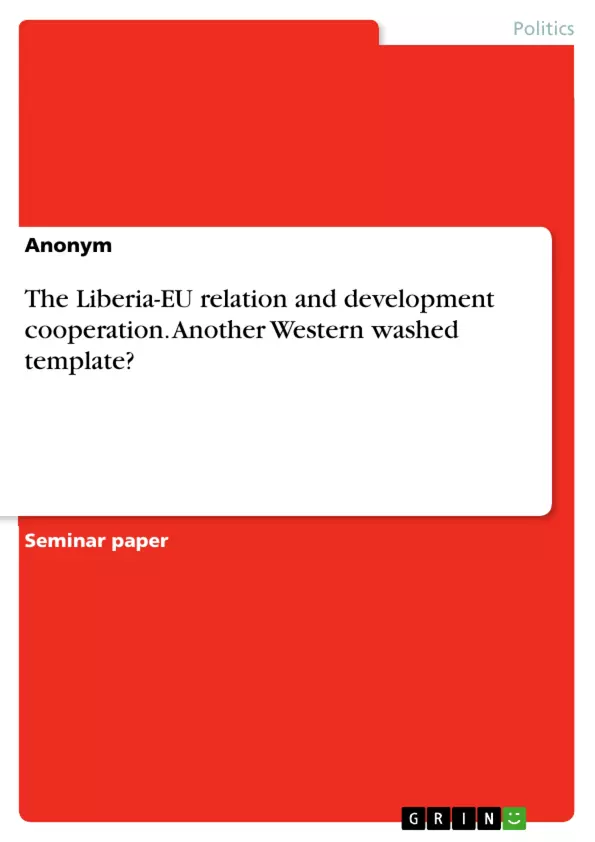The aim of this paper is to analyze DevCo(Development cooperation) agreements between Liberia and the EU to examine the extent to which the EU development ‘aid’ policy maintains global power imbalances in Liberia. Therefore, this paper presents an advisory report by Human Rights Watch (HRW) for the European Commission to persuade the Commission to question its approaches in DevCo. As a first step, the theoretical framework including the legal aspects on which the EU’s development cooperation is based and the concepts of postcolonialism and resilience will be presented. On the basis of this conceptual structure the Liberia-EU relation will be investigated through focusing on the Cotonou agreement and the National Indicative Programme (NIP) between Liberia and the EU to analyze power imbalances.
Since the EU has an expressed competence to conclude bilateral or multilateral agreements with Third Countries (TC), the EU developed a strong legal position and assigned responsibility for development cooperation (DevCo) and humanitarian aid. Hence, the EU concludes DevCo agreements with countries of the Global South like Liberia to promote sustainable development and eradicate hunger and poverty following the UN’s Sustainable Development Goals. However, the EU’s DevCo is called into question because frequently the EU sacrifices important principles such as partnership or human rights to the domestic policy-driven goal of preventing migration movements towards Europe. Thus, the practices of development aid reproducing power imbalances like the loss of cultural identity and social capital are maintained through the new approach of DevCo which promotes equal partnerships but reinforces postcolonial structures.
Inhaltsverzeichnis (Table of Contents)
- Introduction
- Theory
- Legal Aspects of EU Development Cooperation
- Postcolonialism
- Resilience
- Case Study
- Outlining EU and Liberia relation
- A postcolonial neocolonized world order?
- New approaches: Is resilience the key in transcending powers?
- Conclusion
- Strategy and Recommendations
- References
Zielsetzung und Themenschwerpunkte (Objectives and Key Themes)
This paper aims to analyze Development Cooperation (DevCo) agreements between Liberia and the EU to examine the extent to which the EU's development "aid" policy maintains global power imbalances in Liberia. The report aims to persuade the European Commission to question its approach to DevCo and offers alternative proposals.
- Analyzing the EU's legal framework for development cooperation
- Examining the influence of postcolonialism on the Liberia-EU relationship
- Investigating the concept of resilience in the context of DevCo and its potential for promoting or maintaining power imbalances
- Exploring the effectiveness of the Cotonou Agreement and the National Indicative Programme (NIP) in addressing global power imbalances
- Developing recommendations for the EU Commission to create a more sustainable and equitable approach to development cooperation
Zusammenfassung der Kapitel (Chapter Summaries)
The introduction sets the stage for the research question: To what extent does the EU development "aid" policy maintain global power imbalances in Liberia? The paper examines the legal framework for EU development cooperation, emphasizing the EU's express competence for development and humanitarian aid through Article 4 (4) TFEU. The introduction also provides context for the Liberia-EU relationship, highlighting Liberia's history of conflict and fragility. The case study analyzes the EU-Liberia partnership through the Cotonou Agreement and the NIP, focusing on power imbalances that may be perpetuated by DevCo agreements.
Schlüsselwörter (Keywords)
The key themes explored in the paper include EU development cooperation, postcolonialism, resilience, power imbalances, Liberia, Cotonou Agreement, National Indicative Programme (NIP), and development aid. The paper also examines the role of the European Commission and the Directorate-General (DG) for International Development and Cooperation in shaping EU development policies.
Frequently Asked Questions
What is the main goal of the Liberia-EU development cooperation analysis?
The paper examines whether EU development aid policy maintains global power imbalances and postcolonial structures in Liberia.
What is the Cotonou Agreement?
It is a comprehensive framework for EU relations with African, Caribbean, and Pacific (ACP) countries, focusing on poverty reduction and sustainable development.
How does postcolonialism affect current aid policies?
The study argues that current practices often reinforce old power dynamics, leading to a loss of cultural identity and social capital in the Global South.
What is the concept of "resilience" in this context?
Resilience is explored as a new approach in development cooperation, questioning if it truly empowers countries or just shifts the burden of risk.
Why is the EU's development policy criticized by Human Rights Watch?
The EU is sometimes accused of sacrificing human rights principles for domestic goals, such as preventing migration movements towards Europe.
What legal basis does the EU have for development cooperation?
The EU has express competence under Article 4 (4) of the Treaty on the Functioning of the European Union (TFEU) to conclude such agreements.
- Arbeit zitieren
- Anonym (Autor:in), 2020, The Liberia-EU relation and development cooperation. Another Western washed template?, München, GRIN Verlag, https://www.grin.com/document/945206



